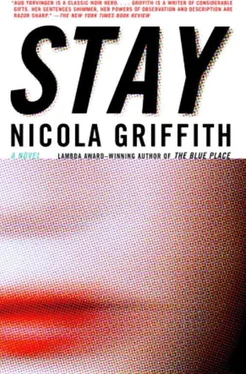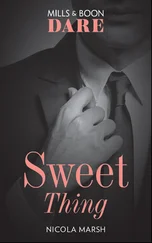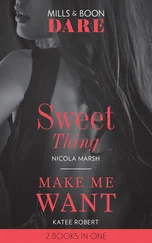I drove through the night.
An angel and aunt. Banker and devil’s advocate. Aud rhymes with crowd. My name is Legion.
Powdery snow dusted the road up the mountain but it was thin and would probably melt off by midafternoon. I would have been able to get the trailer up, after all. Tracks of two different vehicles striped the snow, one set very fresh.
Dornan’s Isuzu stood in the clearing, and thin gray smoke drifted from the cabin chimney. When I climbed down from the cab, my breath steamed, even though it was after midday, and the carrier bags I held in each hand crackled in the cold. The trees stood gaunt and bare against a gray sky streaked with blue. Winter had been late in coming this year, very late, but it had finally arrived.
My boots crunched on the frozen turf, and when I reached the cabin I paused to tap my heels on the stoop to knock away snow, making a mental note to buy a real doormat, before I opened the door.
Dornan sat on his heels by the hearth, poking at the logs in the stove. He spoke without looking up. “It’s different, trying to make a fire inside something.”
“You seem to be doing well enough.” I put down my bags, pulled off my jacket, and hung it on the banister. His lay over the couch in front of the fireplace.
He looked up. “Your face. And you’re limping.”
“Superficial. It’ll heal. I’ll make some tea.” He nodded, more to himself than me.
I carried the bags to the kitchen, filled a kettle, and brought it out to put on the stove. It would be a while. Back in the kitchen, I busied myself with pot and mugs, milk, sugar for Dornan, and the shortbread biscuits I’d bought in Asheville. I brought everything on a tray which I put on the hearth, and then I sat on the couch and Dornan stayed on the floor, and we watched the flames in silence, waiting for the kettle, and the tea, before he said what he had come to say.
The flames grew and rubbed like cats against the cold iron, which ticked and creaked as it expanded. After a few minutes, I heard the first rumble of water warming. I ate a piece of shortbread. It dissolved, rich and buttery, on my tongue.
At the first quavering whistle, I lifted the kettle from the stove using the front of my sweater as an oven mitt, and poured the water and curling steam into the pot. Heavier steam curled back out and I sniffed it. Aromatic.
“You always do that.”
“I know.”
I stirred deliberately, put the lid on the pot, and waited. After three minutes, I poured. Perfect color, like dark oak. I handed a mug to Dornan. He stood, added sugar, and sat again, cross-legged, facing me. His face was tired, but very still. When the worst has happened, there is a certain peace for a while.
“She came back, and now she’s gone again. She told me some of it.” He tasted his tea, added more sugar, stirred, sipped again, and added, “I’m glad you hurt him.”
I nodded but my heart squeezed. Annie had said almost the same thing while Julia lay fighting for her life: I’m glad you killed them.
Dornan stared at his tea. “Now we’ve both lost them.”
There didn’t seem much more to say.
After a while, I made more tea and Dornan added more wood to the stove. The cabin grew warm. The sun managed to break through the cloud and stream through the front windows. I watched the flickering flames and thought of nothing in particular. Eventually Dornan stirred.
“The forecast is for snow tonight, and I have to be in Atlanta by midmorning. I should start back now.”
“Dornan—”
“No. I’ll be all right. The sun won’t be down for another two hours and I’ll be safely onto the interstate by then.”
“That’s not what I was going to say.”
“I know.” He smiled sadly. “But I don’t want to hear anything else. She’s gone. She said she’s sorry, that she always liked me, but that she should never have agreed to marry me in the first place.” He stuck his hand in his pocket and pulled something out. He opened his hand: Tammy’s engagement ring.
“I’m sorry.”
“Not your fault. I know, that’s not what you meant, either.” He stood, reached for his jacket. “I just stayed to tell you. And to thank you. For everything. For finding her and bringing her back, in more ways than one.”
He pulled on his jacket, a cheerful magenta-and-black waterproof, probably picked for him by Tammy, and moved towards the door. I put down my mug and followed him. When he put his hand on the latch, he smiled again. “We hung a good door, didn’t we?”
“We did.” He didn’t move. “I can show you my workshop, if you like, when I get back to Atlanta.”
“You’re coming back then?”
“Yes.”
“When?”
“Soon. Very soon. A day or two.”
“Good. Being out here alone is not good for a person. Grief, I find, is…” He shook his head. “Listen to me, talking as though I know it all.” He laughed shakily. “I thought it would be easier this time.” He looked so small and wounded in his bright jacket that I opened my arms and pulled him in. He wrapped his hands over my hips, leaned his forehead on my breastbone, and wept. He smelled of woodsmoke and tea.
Eventually he stopped. He tried to wipe his face on his jacket sleeve. I brought him a box of tissues. “As you said, every modern convenience, even in the middle of nowhere.”
A smile tried to break through his grief, but unlike the sun, it failed. He mopped and snorted for a minute or two, but turned down my offer of more tea. “I really have to get back, to stay busy. At least for a while. No,” he said as he opened the door, “don’t come out with me. Stay where it’s warm. I’ll be seeing you in a day or two.” He stepped onto the stoop, then turned and took my hand. Either his was very warm, or mine cold. “Friends help. Don’t forget that.” He patted my hand, then walked with that quick step of his over to his Isuzu, opened the door, slid in, turned on the engine and lights, and pulled away.
I carried the rest of my things from the truck—a few clothes, two folders of documents, some toiletries—to the cabin and took them upstairs. The bed was stripped, everything neatly washed and folded. I sniffed the linens: clean, but no longer smelling of laundry soap. It had been at least three days, then.
The weather forecast was wrong; the snow did not come. A little before nine that night I bundled up in jacket, hat, and gloves and went outside to stand under the cold magic of stars and listen to the huge attentiveness of dark. I stood for a long time.
An owl flew across the moon and from half a mile away the sound of a Subaru engine drifted up the mountain. It grew louder, and five minutes later Tammy pulled into the clearing.
When she climbed out of the car, I saw the difference, the sleekness, her buttocks ripe as mangoes, her arms and legs plump and muscled.
“What are you doing standing out here in the cold?”
“Looking at the stars. Thinking of Thomas Wolfe’s description of the night.”
“Oh. Right. Where’s the trailer?”
“In storage in Asheville. I thought there would be snow and I wouldn’t be able to get it up the track.”
We went inside. I lit two lamps, then sat on the couch. Tammy went straight to the stove and opened it so she could rub her hands in front of the naked flames. “Forgot my gloves. I forgot to buy gloves I’ve been so busy.”
That was my cue to ask what she’d been doing, but I felt out of sorts, grumpy on Dornan’s behalf, even though, rationally, I knew none of it was really her fault; it was just that she looked so good and he looked so bad.
“You don’t seem exactly thrilled to see me.”
“I’m not too happy with the world in general. Everything is so… complicated.”
Читать дальше












